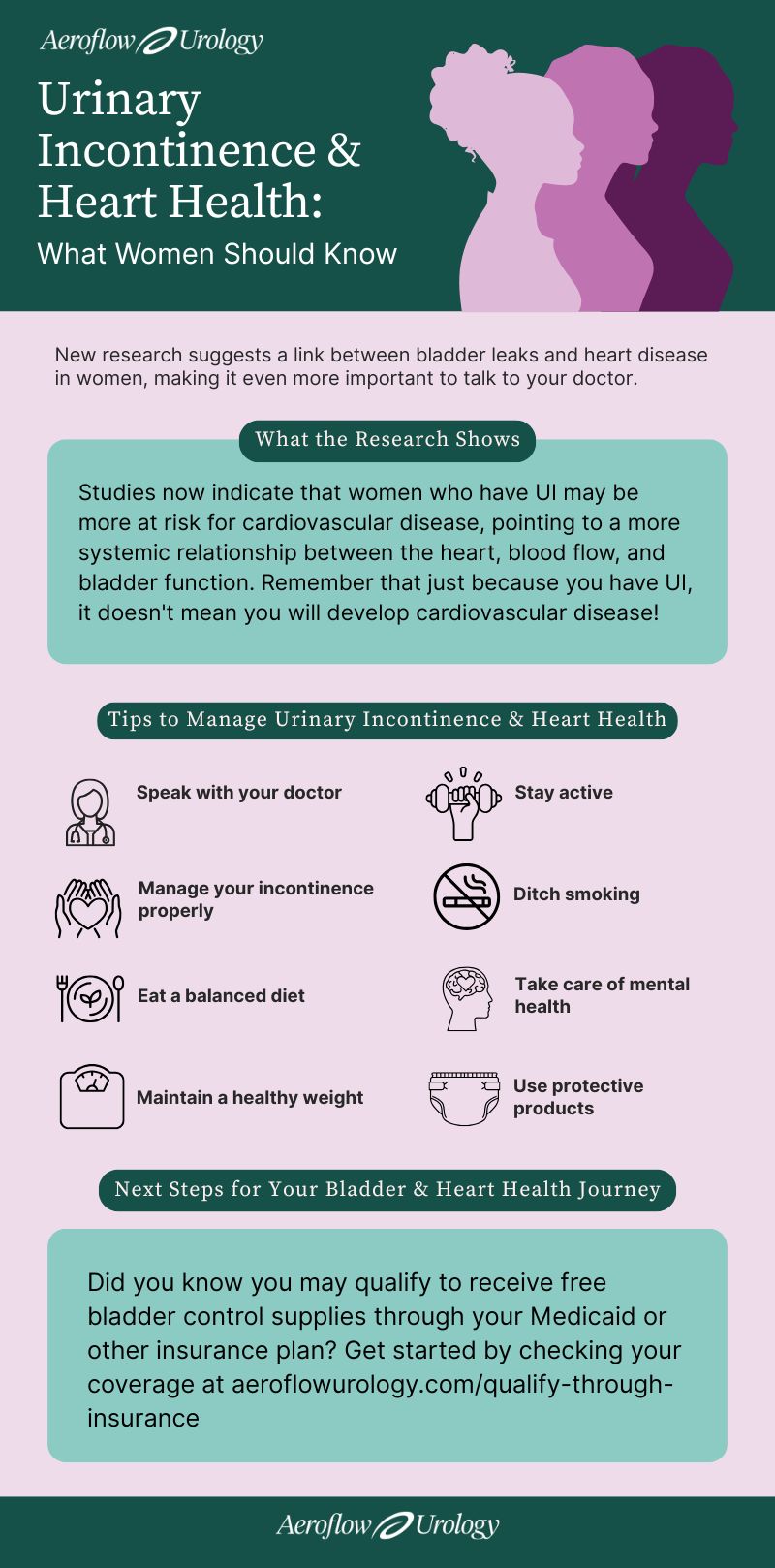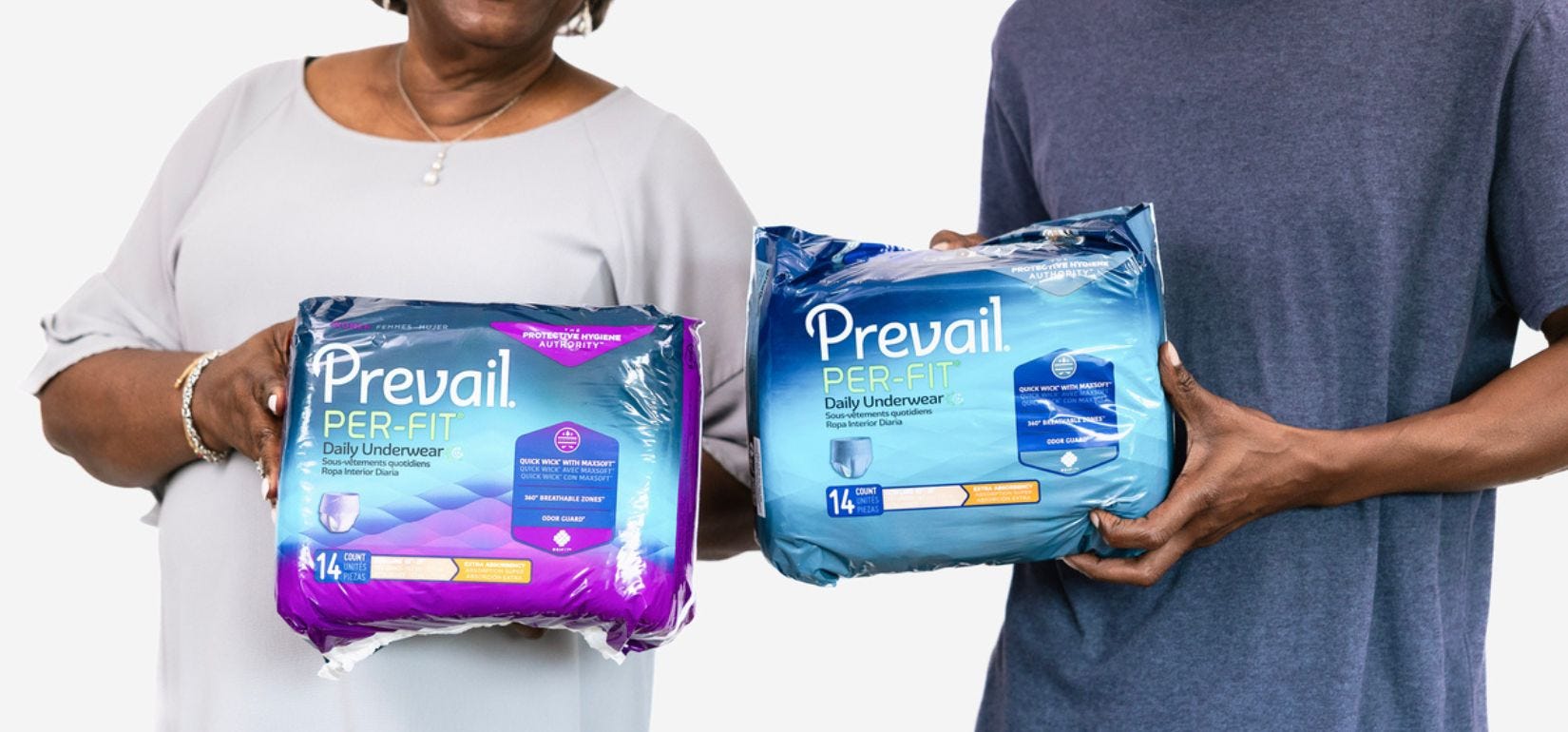Key Takeaways:
- New research suggests a link between bladder leaks and heart disease in women, making it even more important to talk to your doctor. Early detection and treatment can support your overall health.
- Simple changes like staying active, eating well, and avoiding smoking can improve incontinence symptoms and protect cardiovascular health.
- You may qualify to receive free bladder control supplies with Aeroflow Urology to keep you dry and comfortable while managing urinary incontinence.
Jump To:
What Causes Urinary Incontinence in Men & Women?
Cardiovascular Disease & Incontinence in Women
Concerned About the UI-Heart Health Link? Here's What to Know
Tips for Managing UI & Cardiovascular Well-Being
Next Steps for Your Bladder & Heart Health Journey
Get Free Women's Incontinence Supplies With Aeroflow Urology
Bladder leaks are more than just a physical issue—they can be a sign of something deeper.
New research suggests a connection between urinary incontinence and heart disease in women. If you're dealing with leaks, it’s not just about staying dry—it’s about protecting your overall health.
The good news? You’re not alone, and there are simple steps you can take to care for both your bladder and your heart.
What Causes Urinary Incontinence in Men and Women?
Urinary incontinence (UI)—the involuntary loss of bladder control that leads to unintentional leakage—affects millions of adults across the U.S. While both men and women can experience it, research from the National Library of Medicine shows that women are significantly more likely to develop incontinence across all age groups.
Although incontinence is less common in younger women, symptoms often begin to emerge before or during menopause—particularly urge incontinence—and tend to increase with age, especially between the ages of 60 and 80. Alongside physical discomfort, UI can take a toll on emotional well-being, often leading to embarrassment, social withdrawal, and a reduced quality of life.
A single issue rarely causes incontinence. Instead, it's frequently linked to a range of underlying health conditions. For men, an enlarged prostate is a common cause. In women, urinary incontinence may stem from hormonal shifts (due to menopause, perimenopause, pregnancy, or menstruation), pelvic floor trauma from childbirth, or even cancer and its treatments.
There are also shared factors that can contribute to UI in both men and women, including:
- Aging
- Obesity
- Side effects from medications.
- Neurological conditions (such as Alzheimer's disease or dementia or multiple sclerosis).
- Diabetes
- Tobacco use.
- Bladder irritants (like caffeine, alcohol, and spicy foods).
- Constipation
- Urinary tract infections (UTIs).
- Urinary obstructions or blockages.
- Mental health issues, such as anxiety and depression.
Cardiovascular Disease & Incontinence in Women
Among the many conditions associated with incontinence, one connection that's gaining increased attention is the link between cardiovascular disease and UI in women. While pelvic health, menstruation, hormone levels, pregnancy, and childbirth have long been seen as primary factors, emerging research suggests that UI may put women at greater risk of heart health issues.
Studies now indicate that women who have UI may be more at risk for cardiovascular disease, pointing to a more systemic relationship between the heart, blood flow, and bladder function. This insight highlights the importance of viewing UI not just as a standalone issue, but as a potential early sign of broader health concerns.
The University of Iowa recently published a study looking at the health records of over 20,000 women. The study noticed a link between women who currently experience UI and those who have existing risk factors for cardiovascular disease.
While this research doesn't concretely prove that UI can cause cardiovascular disease or vice-versa, it does show a correlation.
The study noted links between the women who experience UI and other cardiovascular disease risk factors:
- Dyslipidemia (cholesterol and fat levels in the blood).
- Type 2 diabetes.
- Stroke
- Bypass graft.
Researchers concluded that more studies need to be conducted to understand the exact link between cardiovascular disease and UI and that women currently experiencing UI should be tested for cardiovascular disease regularly.
Concerned About the UI-Heart Health Link? Here's What to Know
If you have been diagnosed with UI and are concerned about the link to heart health risks, remember that new research, such as the study from the University of Iowa, aims to raise awareness around the possible connection, not alarm.
New studies identifying connections between bladder health and other possible conditions can be used as reminders that taking care of one part of your health— specifically your bladder and pelvic floor health— is essential for different bodily functions.
And remember that just because you have UI, it doesn't mean you will develop cardiovascular disease!
Check your coverage for 100% free incontinence products now!
Check your coverage for 100% free incontinence products now!
Tips for Managing UI & Cardiovascular Well-Being
Use these tips to manage your incontinence symptoms and keep heart health top-of-mind.
Speak With Your Healthcare Provider
Being open and honest with your provider is essential for managing incontinence symptoms and addressing any concerns or worries you may have about how your condition may affect your heart.
Speaking up about your UI symptoms may be difficult, especially if you haven't been open about them with your provider in the past, but it's the best way to identify which type of incontinence you have. With a proper incontinence diagnosis, your healthcare professional can give you medical advice and assess symptoms, develop a treatment plan to improve UI and ease any worries you have about cardiovascular disease.
Remember to inform your provider about all of your health concerns, including risk factors for heart disease, your blood pressure, and any history of diabetes or high cholesterol.
Manage Your Incontinence Properly
Ignoring incontinence usually leads to worsening symptoms and more complications (UTIs, skin breakdown, etc.), so don't avoid managing your UI!
The first step to properly managing your incontinence is getting an accurate diagnosis from your healthcare provider. They'll be able to identify the type of UI you're experiencing and its possible causes. They'll also help you come up with a treatment plan; in most cases, UI can be improved or even reversed.
The second step in managing symptoms is to find the right protective products for your level of leakage and wear them using best practices. Depending on how often and when you leak urine, bladder control pads, women's pull-ons, or adult briefs are excellent choices for keeping you hygienic, healthy, confident, and dry. Many incontinence supplies for women are discreet enough to be worn outside of the home without being seen.
You may also qualify to receive free protective products through your insurance plan with Aeroflow Urology if you meet the requirements!
Make Certain Lifestyle Changes
While using incontinence supplies to control your leakage and address your symptoms, you can make lifestyle changes to improve UI symptoms and keep your heart healthy.
- Eat a balanced diet: Eat a diet full of fruits, vegetables, whole grains, and healthy proteins and fats. Keep in mind that certain foods and drinks are known bladder irritants; spicy foods, tomato-based products, highly processed foods, carbonated beverages, alcohol, and caffeine are items to cut out of your diet if possible.
- Maintain a healthy weight: Whatever a healthy weight looks like for your body, try to maintain it. Obesity and abdominal weight gain have been linked to the onset or worsening UI symptoms due to the pressure extra weight places on the bladder and pelvic floor.
- Stay active: Physical activity isn't just great for your heart but also for your pelvic floor! Regular exercise and incorporating pelvic floor exercises, like Kegels, can strengthen your pelvic muscles and keep your heart healthy.
- Ditch smoking: Smoking tobacco has been linked to UI, so talk with your healthcare provider about how to quit if possible.
- Take care of your mental health: Stress and anxiety have been connected to UI symptoms, so it's essential to find ways to manage these conditions. Exercise, go for walks, meditate, journal, or engage in any other activity you find calming.
- Use protective products: Incontinence supplies for women are discreet enough to be worn outside the house without being seen. Women's bladder control pads are designed to fit the female anatomy, and women's protective underwear is made to look and feel like real underwear.
Did you know you may qualify to receive free bladder control supplies through your Medicaid or other insurance plan? Get started by filling out our easy-to-use Eligibility form to see if you are eligible in less than five minutes.
Next Steps for Your Bladder & Heart Health Journey
As research evolves, so does our understanding of how to prevent and manage UI more holistically—especially in women who may be at risk for or already living with cardiovascular conditions.
Urinary symptoms shouldn't hold you back. See if you qualify for free bladder control supplies covered 100% through your insurance! Fill out our quick and easy Eligibility Form today to check your coverage.
Get Free Women's Incontinence Supplies With Aeroflow Urology
References
Nitti, V. W. (2024). The Prevalence of Urinary Incontinence. Reviews in Urology, 3(Suppl 1), S2. https://pmc.ncbi.nlm.nih.gov/articles/PMC1476070/
Iowa researchers find a possible link between urinary incontinence and cardiovascular disease. (2025). Iowa Now - the University of Iowa. https://now.uiowa.edu/news/2025/04/iowa-researchers-find-possible-link-between-urinary-incontinence-cardiovascular
Disclaimer
Information provided on the Aeroflow Urology blog is not intended as a substitute for medical advice or care from a healthcare professional. Aeroflow recommends consulting your healthcare provider if you are experiencing medical issues relating to incontinence.













